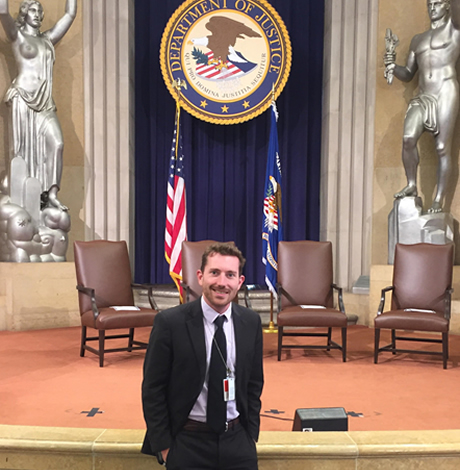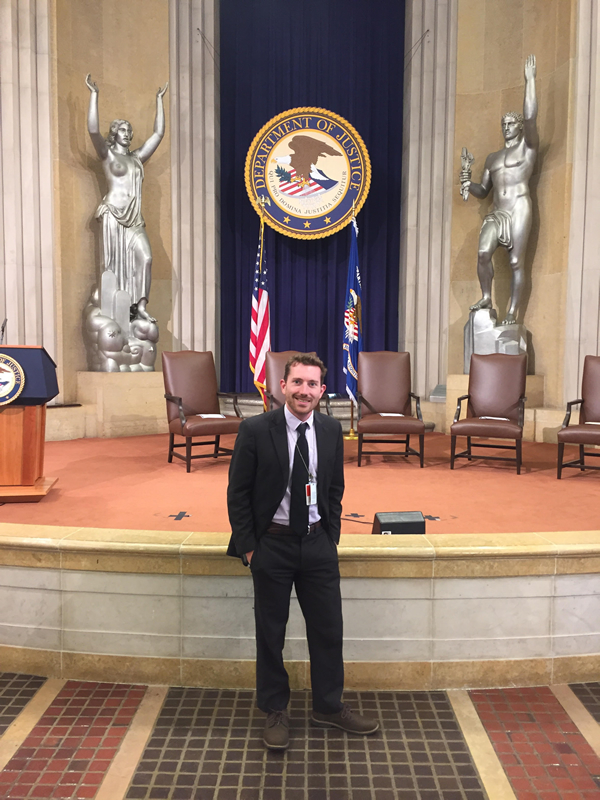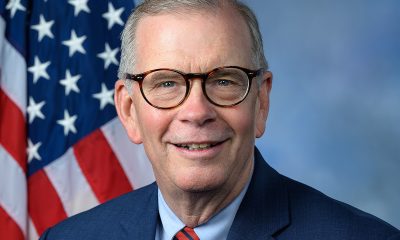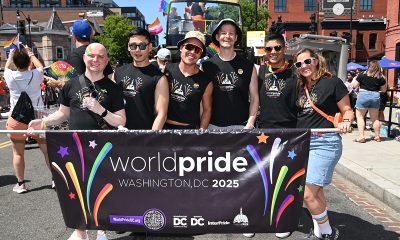News
Washington Blade reporter ejected from DOJ Pride event
Similar celebrations open to media during Obama years


Washington Blade reporter Chris Johnson was ejected from the DOJ Pride event at the Justice Department.
A Washington Blade reporter was ejected from an event Wednesday at the U.S. Justice Department observing June as Pride month — among the last of the events hosted by LGBT affinity groups for federal workers. Similar celebrations under the Obama administration were open to the media.
Dozens of employees — among them LGBT attorneys within the Justice Department and federal law enforcement officials — attended the event, which was titled “Solidarity through Pride” and held in the Great Hall of the Justice Department building.
Representing the Justice Department was acting Assistant Attorney General for National Security Dana Boente, an Obama administration hold-over who also serves as U.S. attorney for the Eastern District of Virginia.
“Whatever an individual’s background, Americans come together to support one another,” Boente said. “In this country, we know that our unity makes us stronger. We’re united in our respect for the rule of law and the preservation of the freedoms of all of us. Americans understand that in this country liberty means liberty for all. Freedom belongs not to any one race, gender or orientation.”
Boente also invoked the shooting at the congressional baseball practice earlier this month in which House Majority Whip Steve Scalise (R-La.) was severely wounded. Lesbian Capitol Police officer Crystal Griner, who was on the scene and helped take down the attacker but was wounded herself, is a hero, Boente said.
“Officer Griner is rightly a hero of the LGBT community; she is also a hero for the entire country,” Boente said.
Under U.S. Attorney General Jeff Sessions, Boente said a top priority would be “combatting the rise of violent crime” and the Justice Department was already taking steps to pursue that goal.
At about that point in Boente’s remarks, a Justice Department official approached and said the Blade had to be escorted out because the DOJ Pride event was closed to the press. The Blade complied.
The closed-press rule for the event is unusual. The Blade attended and covered DOJ Pride events as a member of the press numerous times during the Obama administration — under both former U.S. Attorneys General Eric Holder and Loretta Lynch.
The Blade was also allowed under the Trump administration to cover a Pride event for LGBT service members and civilians at the Pentagon with full cooperation of officials. Washington Blade Editor Kevin Naff delivered the keynote address last week at the Small Business Administration’s Pride event.
Naff criticized the decision to close the event to media outlets.
“These events have historically been open to the media and this action at DOJ today is an unfortunate break with tradition,” Naff said. “Holding Pride celebrations behind closed doors violates the very spirit of such events and we urge all government agencies to let the sun shine in.”
A Justice Department official responded to Blade inquiries about the DOJ Pride event via email shortly before it began and said the event would be closed to press, but by that time — less than 30 minutes before the event was set to begin — the Blade was already entering the event after being informed second-hand the event was cleared by public affairs. The email was unseen until after the Blade was escorted out.
As Buzzfeed reported, U.S. Attorney General Jeff Sessions spoke positively about the DOJ Pride event on video when an intern asked him about it last week during another event.
“We are going to have a pride group, in this very room, I think next week, I believe it is, and so that’s perfectly appropriate, and we will protect and defend and celebrate that — and protect the rights of all transgender persons,” Sessions said.
Sessions has a long anti-LGBT history as a U.S. senator from Alabama. Along with Education Secretary Betsy DeVos, he revoked guidance to schools assuring transgender students have access to the bathroom consistent with their gender identity.
Set to deliver keynote addresses at the DOJ Pride event — and unseen by the Blade — were Michelle Benecke, executive director for management integration for the Immediate Office of the Undersecretary for Management at the U.S. Department of Homeland Security, and Sultan Shakir, executive director of the D.C.-based youth group SMYAL, or Supporting & Mentoring Youth Advocates & Leaders.
Set to deliver the closing remarks was Granette Trent, assistant director for affirmative employment on the Equal Employment Opportunity Staff at the Justice Management Division.
Attending in person to receive the Gerald B. Roemer Community Service Award — and with a newly dyed green streak in his hair — was Gavin Grimm, the transgender student suing his Gloucester County high school for not allowing him to use the restroom consistent with his gender identity.
Attorneys at the Justice Department’s Civil Rights Division were set to the receive the James R. Douglass Award for litigation started under the Obama administration in favor of transgender rights.
One recipient of the award was the Civil Rights Division team that challenged North Carolina anti-LGBT House Bill 2 (which has since been withdrawn under Sessions after Gov. Roy Cooper replaced HB2 with a different law LGBT advocates say is still discriminatory). The other was the Civil Rights Division team that sued Southeastern Oklahoma State University for allegedly discriminating against a transgender professor.
Singing the National Anthem at the event was Garrick Jordan, a member of the Gay Men’s Chorus of Washington. The emcee was Robert Koch, vice president of DOJ Pride and attorney for the appellate section of the Civil Rights Division.
District of Columbia
Reenactment of 1965 gay rights protest at White House set for April 17
Event to mark 60th anniversary of historic picketing

D.C.’s Rainbow History Project is inviting members of the local LGBTQ community and its supporters to participate in a reenactment of what it calls the historic 1965 first gay rights protest outside the White House.
The event is scheduled to begin at 4 p.m. Thursday, April 17 on the sidewalk in front of the White House.
In a statement, Rainbow History Project says the 1965 protest was organized by local gay rights pioneers Frank Kameny and Lilli Vincenz on behalf of the Mattachine Society of Washington, one of D.C.’s first gay rights groups that Kameny co-founded in the early 1960s.
“Led by Dr. Kameny and Dr. Vincenz, picketers demanded action on the Mattachine Society’s four major issues: the exclusion of homosexuals from Federal employment; the punitive policies of the U.S. Military; blanket denial of security clearances to gay people; and government refusal to meet with the LGBTQ community,” the statement says.
The statement referred to the titles of Kameny and Vincenz in connection with their academic doctorate degrees
“Although Dr. Kameny died in 2011, and Dr. Vincenz in 2023, Rainbow History Project and its all-volunteer corps will picket in their honor and demonstrate there is a new generation of young activists ready to take up their signs and their fight for equal rights for all LGBTQ people,” the statement says.
Among those expected to participate in the April 17 White House reenactment picketing is longtime D.C. LGBTQ rights advocate Paul Kuntzler, who is the last known survivor of the 1965 White House gay rights protest. Kuntzler was expected to carry a picket sign similar to the one he carried in 1965.
In its research on the 1965 gay White House protest, Rainbow History Project learned of a letter that Kameny sent to then President Lyndon B. Johnson outlining the demands of the White House protesters.
“We ask, Mr. President, for what all American citizens – singly and collectively – have the right to ask,” the Kameny letter states. “That our problems be given fair, unbiased consideration…consideration in which we, ourselves, are allowed to participate actively and are invited to do so.”
The RHP statement says the group “will carry replicas of the original protest signs and hand out literature explaining the picket to passersby and tourists.”
Myanmar
LGBTQ advocacy group joins Myanmar earthquake relief effort
March 28 quake killed thousands, devastated country’s second-largest city

A powerful earthquake that rocked Myanmar on March 28 unleashed devastation across the central part of the country.
The U.S. Geological Survey measured the quake at 7.7, and pinpointing its epicenter roughly 10 miles west of Mandalay, the country’s second-largest city. A 6.4-magnitude aftershock jolted the area 12 minutes later, compounding the destruction and deepening the crisis for a nation already strained by conflict.
The earthquake struck with terrifying intensity near its epicenter, wreaking havoc on Mandalay and the nearby city of Sagaing.
Mandalay, a bustling city of approximately 1.5 million residents, bore the brunt of the destruction. Among the most striking losses was the 12-story Sky Villa Condominium, which collapsed, leaving scores trapped beneath the wreckage. Rescue workers scrambled to pull survivors from the rubble, but the rising death toll underscored the tragedy’s magnitude.
In Sagaing, which is located closer to the epicenter, more than 70 percent of buildings sustained damage. The Ava Bridge, an essential artery spanning the Irrawaddy River, collapsed, cutting off a critical connection to Mandalay. The earthquake’s shallow depth of less than seven miles amplified its power, reducing homes, temples, and schools to rubble.
The earthquake’s death toll continues to climb, with at least 3,649 confirmed dead, more than 5,000 injured, and approximately 145 people missing. Amid the widespread devastation, questions loom about the impact on vulnerable populations. The Washington Blade reached out to Colors Rainbow, an organization advocating for LGBTQ rights in Myanmar, to understand how the crisis has affected one of the nation’s most marginalized communities.
Colors Rainbow Executive Director Hla Myat Tun spoke about how his organization is working to address the crisis faced by Myanmar’s LGBTQ community in the aftermath of the earthquake.
Colors Rainbow has implemented a system of multipurpose cash transfers, directing funds to local LGBTQ partner organizations. These grassroots partners, in turn, provide essential support to affected individuals that includes emergency cash assistance, food, non-food items, clean water, and basic emotional support tailored to the immediate needs of their communities.
“We estimate that around 500–800 LGBTQ individuals have been impacted in the affected areas, particularly in Mandalay Region, Sagaing Region, and southern Shan state,” said Hla Myat Tun. “So far, we have been able to directly assist around 80–100 LGBTQ individuals.”
Hla Myat Tun told the Blade that Colors Rainbow is actively gathering data to assess the specific challenges that LGBTQ people are facing in the aftermath of the earthquake.
Preliminary observations, he noted, point to heightened vulnerability among LGBTQ people, driven by social exclusion and limited access to mainstream humanitarian aid. Hla Myat Tun, however, emphasized more comprehensive information is necessary to fully understand the scope of their needs and vulnerabilities in this crisis.
“We are partnering with international LGBTQ and feminist organizations that focus on displaced communities,” said Hla Myat Tun. “These partners provide emergency funds, and we coordinate with local LGBTQ groups to deliver aid directly to affected individuals on the ground.”
Addressing reports of military restrictions on humanitarian aid, Hla Myat Tun explained how Colors Rainbow is managing to reach LGBTQ people who are in conflict zones and areas the military junta controls. Hla Myat Tun highlighted the importance of the organization’s trusted local LGBTQ partners, who are embedded in these regions. Their presence and established networks, he said, are vital in navigating restricted areas and ensuring that aid reaches the LGBTQ people who are most in need.
Hla Myat Tun also provided insight into how Colors Rainbow is tailoring its relief efforts to meet the LGBTQ community’s specific needs.
He said his organization is gathering information directly from LGBTQ people through close coordination with its local partners, relying on both formal and informal communication channels. Hla Myat Tun told the Blade his team conducts daily check-ins via quick telephone calls, ensuring a continuous flow of information to guide their response efforts despite limited internet access, electricity and other challenges.
“Our approach is collaborative — we set strategies and share responsibilities to respond flexibly and safely, based on the rapidly changing local context,” he said. “Personal stories are being documented, but for security reasons, we are cautious about sharing them publicly.”
When asked whether staff or volunteers had harassment, discrimination, or violence while delivering aid — a concern given the precarious legal and social climate for LGBTQ people in Myanmar — Hla Myat Tun said there have been no reported incidents thus far.
“So far, we haven’t received any reports from our staff or local partners about harassment or violence while delivering aid,” he noted, emphasizing Colors Rainbow remains vigilant and has implemented robust safety protocols to protect all involved.
Colors Rainbow relies primarily on funding from international LGBTQ-focused partners. He noted, however, humanitarian funding specifically dedicated to LGBTQ communities remains vastly under-resourced, relative to the pressing needs on the ground. Hla Myat Tun said this shortfall severely limits the scale and reach of Colors Rainbow’s efforts.
“While Myanmar’s legal framework remains outdated, societal attitudes — especially during the civilian government — have shown signs of progress,” said Hla Myat Tun. “We have seen positive change thanks to the work of local LGBTQ organizations.”
“In the current crisis, many communities are working together despite legal barriers. However, in areas without LGBTQ-led organizations, inclusive humanitarian responses are still lacking,” he added. “There’s an urgent need for international humanitarian actors to understand and implement LGBTQ-inclusive practices in Myanmar.”
When asked about long-term strategies to support the recovery and resilience of LGBTQ communities as Myanmar rebuilds, Hla Myat Tun affirmed Colors Rainbow is deeply committed to fostering resilience. The organization’s initiatives include leadership development, community empowerment through training and workshops, sub-granting programs, and organizational development support. He also highlighted Colors Rainbow’s advocacy for LGBTQ-inclusive policies and collaboration with ethnic groups to promote an inclusive federal democracy, and specifically thanked Outright International, a global LGBTQ and intersex rights group, for “amplifying our work.
“This kind of international attention shines a spotlight on the challenges LGBTQ communities in Myanmar are facing and helps open doors for more support,” Hla Myat Tun told the Blade. “It also boosts visibility and solidarity, both locally and globally, which we deeply appreciate.”
Hungary
Hungarian MPs amend constitution to ban public LGBTQ events
Viktor Orbán’s government spearheaded amendment

Hungarian MPs on Monday voted to amend their country’s constitution to ban public LGBTQ events.
The vote took place less than a month after lawmakers banned Pride events and gave authorities the green light to use facial recognition technology to identify those who participate in them.
The Associated Press notes MPs approved the constitutional amendment — which Prime Minister Viktor Orbán’s Fidesz-KDNP coalition government proposed — by a 140-21 vote margin. Authorities before the vote removed a group of protesters who tried to block the entrance to a parliament parking garage.
Orbán’s government over the last decade has moved to curtail LGBTQ and intersex rights in Hungary.
A law that bans legal recognition of transgender and intersex people took effect in 2020. Hungarian MPs that year also effectively banned same-sex couples from adopting children and defined marriage in the constitution as between a man and a woman.
An anti-LGBTQ propaganda law took effect in 2021. The European Commission sued Hungary, which is a member of the European Union, over it.
MPs in 2023 approved the “snitch on your gay neighbor” bill that would have allowed Hungarians to anonymously report same-sex couples who are raising children. The Budapest Metropolitan Government Office in 2023 fined Lira Konyv, the country’s second-largest bookstore chain, 12 million forints ($33,115.76), for selling copies of British author Alice Oseman’s “Heartstopper.”
Former U.S. Ambassador to Hungary David Pressman, who is gay, participated in the Budapest Pride march in 2024 and 2023. Pressman was also a vocal critic of Hungary’s anti-LGBTQ crackdown.
The Washington Blade has reached out to Budapest Pride for comment on the constitutional amendment.
-

 Opinions4 days ago
Opinions4 days agoIt’s time for new leadership on the Maryland LGBTQIA+ Commission
-

 The White House4 days ago
The White House4 days agoWhite House does not ‘respond’ to reporters’ requests with pronouns included
-

 Noticias en Español5 days ago
Noticias en Español5 days agoINDIGNACIÓN: ¡El transfeminicidio de Sara Millerey en Colombia nos cuestiona como sociedad!
-

 Congress5 days ago
Congress5 days agoHouse Republicans advance two anti-trans education bills












